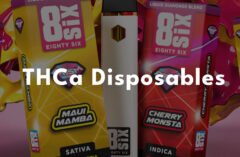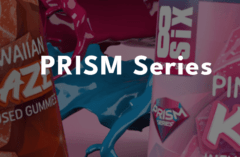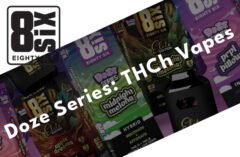No doubt you have heard about THC. And you have probably heard about “Delta 9” in reference to it. But what about Delta 8, its mild-mannered cousin? Here is all you need to know about Delta 8 THC, why some people prefer it, and what the status of Delta 8 is currently in the state of Utah.
Delta 8 Vs. Delta 9 THC
Delta 8 is also known as delta-8-tetrahydrocannabinol. It is a natural cannabinoid that is found in cannabis and hemp. Its chemistry is very similar to THC. Both Delta 9 and Delta 8 affect the body as well as the mind in about the same way since they both connect with the endocannabinoid system, albeit in slightly different ways.
Studies have shown that Delta 8 THC can help reduce anxiety, protect the brain, prevent nausea, and help with insomnia. (1) Anecdotal evidence also suggests that Delta 8 may be able to help with pain more effectively than Delta 9. (2)

The main difference between the two is strength. Delta 8 is sometimes called “THC Light” or the “Diet Weed” because it is known for producing a smooth, mild and light “high” that is said to be more energizing than Delta 9 medical marijuana. Make no mistake, Delta 8 can get you high. But many people prefer this calmer experience versus the effects of more powerful THC strains.
People who are sensitive to THC in general and experience anxiety or paranoia when taking Delta 9 should also take caution when using Delta 8. Even though the side effects may not be as intense, you may still experience them.
Dosing Methods and “Staying Power” of Delta 8
Just like regular THC, how Delta 8 affects you will depend in large part on your own unique body, rate of metabolism, and age, amongst other factors.
There are as many methods of administering Delta 8 as there are for Delta 9. Each will have their unique timeframe for how long it will take to kick in as well as how long the effects will last.
Similar to regular THC, vaping, tinctures, and gummies produce very quick results. Individuals will feel the effects in as little as 15 minutes and the effects will last up to five hours. Delta 8 capsule and edibles take a little bit longer to kick in since they have to go through the digestive system. These dosing methods can take up to 2 hours to feel the effects, but they can last up to 8 hours.
Another thing to keep in mind when it comes to Delta 8 is that it can still show up on a drug test just like regular THC. In fact, Delta 8 can actually show on a hair follicle test for up to 90 days.
What About Safety with Delta 8?
You have probably heard some not-to-pretty stories about Delta 8 and safety. In fact, there has been enough press around this for anyone to raise an eyebrow and take notice.
Here is the deal when it comes to safety and Delta 8. Delta is an analogue of Delta 9 and is a substance that exists naturally with cannabis and hemp. But here’s the rub. The majority of Delta 8 comes from hemp using extraction and conversion via synthetic means. In today’s cannabis climate where Delta 8 is a hot commodity, unscrupulous manufactures use harsh (and cheap) solvents and other chemicals to do this, at the expense of public safety.
A study conducted in April 2021 by the U.S. Cannabis Council found dozens of different Delta 8 products which had high levels of not only solvents but heavy metals as well. The levels were too high for human consumption, especially when it came to Delta 8 vape carts. The products were obtained from unregistered, unlicensed stores operating across 8 states. (3)
There are dozens of known health risks associated with these chemicals, including liver damage and brain damage. (4)
Dizziness, vomiting, and blacking out are also short-term side effects of overexposure to solvents in particular. These are the exact symptoms that many people experienced after having used these black-market products. Unfortunately, a large number of children have also gotten poisoned from gummies and candies that contain poorly manufactured Delta 8. (5)
Is Delta 8 Legal in Utah?
Delta 8 THC is mostly extracted from hemp, as we mentioned before, and this causes legal issues as well.
The Farm Bill of 2018 states that hemp is legal to grow across the United States. According to the Bill, “(a)ll derivatives, extracts, cannabinoids, isomers, acids, salts, and salts of isomers, whether growing or not, with a delta-9 tetrahydrocannabinol concentration of not more than 0.3 percent” are legal. (6)
Federally speaking, the DEA (US Drug Enforcement Administration) has given mixed signals as to where they stand on the issue of Delta 8 legality. While the DEA put out an Interim Final Rule (IFR) in 2020 that hinted at the fact that the agency may be classifying Delta 8 as a Schedule I Controlled Substance soon (as Delta 9 THC currently is at the federal level), other indications seem to point to the opposite. (7)
On the state level, many interpret the Bill to mean that it is okay to produce Delta 8 THC from hemp since manufacturers are not extracting Delta 9.
Utah is among roughly a dozen states who view the wording of the Bill loosely and who do not agree that Delta 8 from hemp should be legal. Many state legislators also have obvious concerns about safety when it comes to Delta 8.
Delta 8 products may not be produced, sold, or used in the state of Utah. That being said, the Beehive state does have a very well-structured Utah Medical Marijuana program that currently serves over 20,000 card-carrying members.
Fortunately Delta 9 THC products as well as CBD can be purchased in tincture, capsule, transdermal, vape cart, and 1 ounce flower pouches to registered, verified medical marijuana card-carriers. These products can be purchased at a licensed Utah dispensary to pick up in person or via delivery.
Reference:
- Pharmacology of Cannabinoids
- Delta-8-THC: The Latest Cannabinoid
- Delta-8 THC Table of Contents
- Organic Solvent Neurotoxicity
- What Does it Take to Manufacture Delta-8 THC?
- USDA Farm Bill
- Town Hall with USDA and DEA




